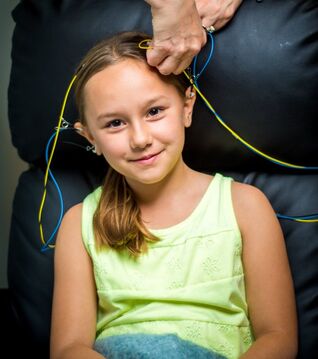Is ADD a Real Condition? Insomnia’s Critical Role in Attention Disorders

The conventional understanding of Attention Deficit Disorder (ADD) and Attention Deficit Hyperactivity Disorder (ADHD) as standalone conditions has been the cornerstone of decades of scientific literature, self-help books, pharmaceutical profits, and child psychology diagnoses. The very idea of ADD has become so entrenched in our culture that asking questions about its validity seems almost impossible to comprehend professionally. Let’s deconstruct the accepted narrative and see what’s underneath.
The Sleep-Attention Connection
Recent studies reveal a fascinating correlation between sleep quality—particularly delta slow-wave sleep—and prefrontal cortex function. During optimal slow-wave sleep, the prefrontal cortex undergoes essential restoration and neural pathway reorganization. When this process is disrupted, the consequences mirror classic ADD/ADHD symptoms with remarkable, even mirror-like precision.
Researcher Dr. Christian Fadeuilhe, Department of Psychiatry, Vall d’Hebron University Hospital
Barcelona, Spain, has demonstrated that individuals experiencing chronic sleep disruption show a 40-60% reduction in prefrontal cortex activity during attention-demanding tasks. This reduction creates a neurological profile nearly identical to that observed in diagnosed ADD/ADHD cases.
Anxiety’s Amplifying Effect
When chronic sleep disruption combines with anxiety, the impact on prefrontal cortex function intensifies dramatically. Anxiety states trigger persistent activation of the amygdala, which in turn suppresses prefrontal cortex function—creating a “perfect storm” for attention difficulties. This combination explains why traditional ADD/ADHD diagnoses often coincide with anxiety symptoms.
The Stimulant Paradox
Current treatment protocols typically rely on psychostimulants like Adderall to address attention deficits. While these medications provide immediate attention enhancement through forced prefrontal cortex stimulation, they simultaneously create a problematic cycle:
- Initial but short-lived boost in focus and attention
- Disrupted sleep architecture, notably reduced slow-wave sleep
- Deteriorating baseline attention capacity
- Increased medication dependence
- Entrenched sleep quality degradation
This cycle explains why many individuals require increasing medication doses over time while their baseline attention capabilities continue to decline.
The Neurofeedback Alternative
Amplitude-based neurofeedback presents a promising alternative approach that addresses root causes rather than symptoms. This non-invasive technique helps stabilize irregular EEG patterns associated with poor sleep quality and anxiety:
- Restores natural sleep architecture
- Enhances slow-wave sleep quality
- Reduces anxiety-related brain wave patterns
- Improves natural attention capabilities
- Requires no ongoing medication
Personal Transformation Stories
Sarah’s Journey: From Medication to Mindfulness
Sarah Mitchell, a 28-year-old software developer, received her ADD diagnosis at age 12. After fifteen years of stimulant medication, she discovered neurofeedback through her sleep specialist. “Within four weeks of starting neurofeedback, my sleep quality improved dramatically. As my sleep improved, I noticed I could focus naturally—without medication. It was like discovering I’d been treating the smoke instead of the fire all along.”
Michael’s Recovery: A Parent’s Perspective
When Jennifer Matson’s son Michael started showing attention difficulties in school, she resisted the school psychologist’s insistence on an immediate medication protocol. “Something felt incomplete about the ADD diagnosis. Michael’s sleep had always been erratic, and he seemed constantly anxious about school.” After two weeks of starting Sleep Recovery, Michael’s deep-stage sleep stabilized, his anxiety decreased, and his attention improved so well that his teacher called to ask what had happened.
David’s Professional Transformation
David Solomon, a 45-year-old executive, struggled with apparent ADD symptoms throughout his career. “I relied on increasing doses of stimulants just to function. Neurofeedback helped me realize my real issues were sleep quality and anxiety, not attention, as I was told. Once those improved, my ability to focus did too—without the edgy side effects of my prescriptions.”
Frequently Asked Questions About Neurofeedback Treatment
How long does neurofeedback take to show results?
Most individuals notice initial improvements in sleep quality within 2-3 weeks, with attention benefits becoming apparent by weeks 4-6. Complete treatment protocols typically span 15-20 sessions.
Can I stop my current medications immediately?
Always work with your healthcare provider to develop an appropriate transition plan. Many individuals gradually reduce medication as their sleep and attention naturally improve.
How does neurofeedback compare to traditional ADD/ADHD treatments?
Research indicates that 75-80% of individuals who complete neurofeedback protocols maintain improvements without ongoing intervention, compared to less than 30% for medication-only approaches.
What age groups can benefit from neurofeedback?
The treatment is effective across age groups, from children as young as six to adults in their seventies. Its non-invasive nature makes it particularly suitable for young, developing brains.
References:
- Insomnia Disorder in Adult Attention-Deficit/Hyperactivity Disorder Patients: Clinical, Comorbidity, and Treatment Correlates. https://www.frontiersin.org/journals/psychiatry/articles/10.3389/fpsyt.2021.663889/full
-
The associations of insomnia symptoms with daytime behavior and cognitive functioning in children with attention-deficit/hyperactivity disorder. https://jcsm.aasm.org/doi/10.5664/jcsm.10060
-
Is ADHD really a sleep problem?. European College of Neuropsychopharmacology. https://www.sciencedaily.com/releases/2017/09/170904093443.htm
-
In-School Neurofeedback Training for ADHD: Sustained Improvements From a Randomized Control Trial. https://publications.aap.org/pediatrics/article-abstract/133/3/483/32343/In-School-Neurofeedback-Training-for-ADHD?redirectedFrom=fulltext
- Neurofeedback and Attention-Deficit/Hyperactivity-Disorder (ADHD) in Children: Rating the Evidence and Proposed Guidelines. https://pmc.ncbi.nlm.nih.gov/articles/PMC7250955/

